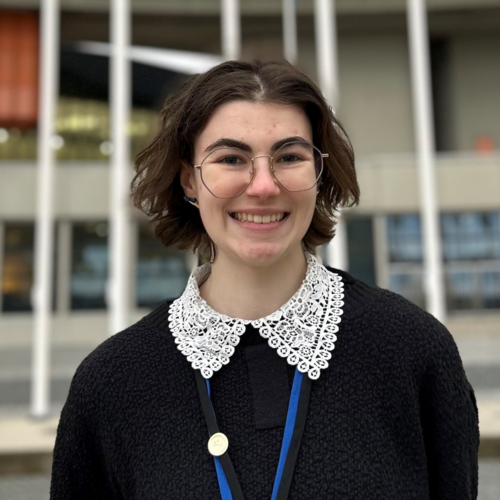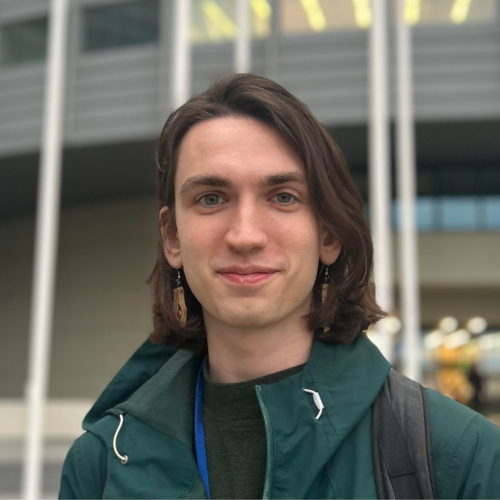Hosted by the Vienna-based organization Zero Project, the Zero Project Conference is one of the largest gatherings in the world that centers on disability inclusion. Since Fulbright Austria developed a relationship with Zero Project in 2023, invitations to attend have also gone out to current Fulbright Austria program participants. This year’s conference—#ZeroCon24, which focused on inclusive education and on information & communication technology (ICT)—was attended by 2023–24 US Fulbright community-based combined grantee Sarah Kovacic and 2022–24 US teaching assistant Duncan Donahue, both of whom share their experiences at the event below.
#ZeroCon24: an overview from the perspective of two Fulbright Austria program participants
11 March 2024Two current program participants share their experience attending the 2024 Zero Project Conference (#ZeroCon24).
Sarah Kovacic
2023–24 US Fulbright Student Community-Based Combined Grant
As a result of the flourishing relationship between Fulbright Austria and Zero Project, I had the amazing opportunity to attend #ZeroCon24 for three days. This year, the conference hosted over 1,000 people from more than 100 countries at the United Nations office in Vienna and was virtually streamed and recorded for remote participation; I could not believe that I was one of those attendees until I was standing at the United Nations office, enveloped in the halls where international discourse actively takes place. When I had first received the invitation in my inbox one month ago, I instantly knew that, as someone currently working in education as an English-language teaching assistant, this was an opportunity that I could not ignore. After going to the conference and sitting in back-to-back sessions every day, I am so grateful that I made the decision to attend the conference. #ZeroCon24 has altered how I see myself as an educator and my role as an English-language teaching assistant in Austrian schools. Prior to this conference, I did not have much knowledge about inclusive education for people with disabilities outside of what I had learned through my own research. For me, #ZeroCon24 was a launchpad from which I will continue to educate myself about creating educational materials that are inclusive and accessible for as many people as possible, with or without disabilities. Even in my community project for my Community-Based Combined Grant, which is an archival internship at the Exilarte Zentrum research center at the University of Music and Perform Arts Vienna, I find myself reexamining my work with a closer eye to consider how I might make information more accessible to visitors of the exhibitions and website as well as to users of the database that I am creating as part of my Fulbright project.

As I reflected on those three days, I realized what really enhanced my experience at #ZeroCon24 was not only the informative sessions and engaging panels but also the connections I made along the way. Throughout the conference, I met other English-language TAs currently working throughout Austria, and we would often closely dissect the sessions we had just come from. We had such in-depth conversations about how Austrian and US systems of education compared in regards to disability and inclusion and about how we could possibly apply what we were learning in the sessions to our teaching in Austrian classrooms. By speaking with other TAs about the conference, my interpretations of the sessions were challenged, and I was pushed to think more deeply about the meaning and application of inclusive education. Additionally, I had the opportunity to meet many inclusive-education advocates, both people with and without disabilities, and to build connections with people that have had starkly different educational experiences from my own. Over these next several weeks after the conference, I hope to build deeper relationships with these new connections so that I may learn more from them and their experiences. In just three days, my network expanded to include some truly amazing TAs and powerful disability advocates that are all driven to see equity and inclusion become the norm in classrooms globally, and I am so grateful that I had the opportunity to connect with all of them at #ZeroCon24. I will forever carry with me what I learned about inclusive education for people with disabilities with me, and I will utilize this new knowledge to change and to improve myself, my teaching methods, and the institutions that I am connected to.
Duncan Donahue
2022–24 US teaching assistant
On the first morning of the conference, I arrived at the UN office and walked in awe past the circular arrangement of member-state flags, reminding me of the miniature model I had seen at a Model United Nations conference almost a decade ago. Ghada Fathi Waly, the executive director of the United Nations Office on Crime and Drugs, opened the conference by speaking about the conference’s integral role in bringing together the members of civil society who were realizing the aims of the UN’s Convention on the Rights of Persons with Disabilities. She also highlighted the fact that 16% of disabilities are the result of armed conflicts—a timely and important but often overlooked element of disability rights—and stressed the importance of holding a global view of the primary causes of disability and obstacles to inclusion.

Each of the three days was packed with insightful, inspirational, and thought-provoking speakers from around the world, but one from Austria made a special impression on me. Last year, I had the honor of being a US teaching assistant (USTA) in Linz, so I made time to hear Johannes Fellinger speak about his coordination with the Gehörlosenverband Oberösterreich to provide Ukrainian refugees who are deaf and hard of hearing with accessibility services and community upon arrival in Austria. Word of the proactive and welcoming nature of these efforts spread quickly among the Ukrainian deaf community, and Linz has become a prime destination among all European cities for deaf Ukrainians. Even though I no longer live in Upper Austria, I felt proud of my former adopted city and wished I had been more aware last year of the amazing work going on right around the corner from the secondary school where I taught.
The conference closed with a performance by the White Hands Chorus Nippon, a Japanese mixed-ability youth choir that performed Beethoven’s Ode to Joy. I had never seen a choir perform through sign language before, and I wasn’t quite sure what to expect. Rather than showcasing a series of perfectly synchronized and identical signing motions, the children signed each word with their idiosyncratic embellishments and moved through them at their own rhythm. This gave the choir’s performance an exhilarating and vibrant aura, as the gloved hands of the performers swelled and danced not uniformly but nevertheless as one.
Attending #ZeroCon24 will be an unforgettable highlight of my time as a USTA. None of this experience would have been possible without Fulbright Austria’s amazing work to connect the members of its community with the best opportunities for connection, education, and growth imaginable. Thank you so much, Fulbright Austria!